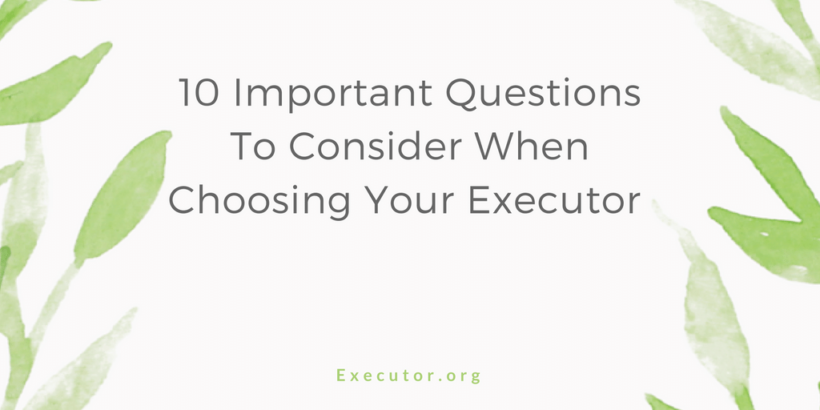
10 Important Questions To Consider When Choosing Your Executor
This article by Executor.org originally was published on Everplans.com.
The person you name in your will as executor is responsible for many things, including closing your accounts, making sure your beneficiaries receive any inheritances granted to them, and selling off property, such as your home, vehicles and furniture.
In short, it’s a big job. While many people appoint a spouse or child without giving it much thought, it makes sense to consider carefully who’s best suited for it. As the founder of Executor.org, my goal is to always find ways to simplify the executor process for individuals tasked with managing the 100+ step role. (I did say it was a big job.)
Getting your estate (and life) in order will help set your executor up for success, as does knowing the person you choose is truly up for the task. Here are the 10 questions to consider when making your decision:
1. Is the person trustworthy?
You’re asking your executor to properly handle your assets and follow the instructions you’ve left in your Will (and other end-of-life documents). If you have any doubts about their trustworthiness, ability to behave ethically, or think your beneficiaries may resist working with them, it’s better to pick someone else.
2. Do they know your wishes?
The goal is to leave as little as possible to chance in this process and spare your executor from having to interpret, or outright guess, what you meant in your Will. But even with the best planning, they will likely have to make some judgment calls after you die — so pick someone who knows you and your wishes.
3. Do they respect your wishes?
You don’t want to be overruled from the grave. If someone is strongly opposed to your wishes — for example, being cremated or leaving money to a certain family member — and you fear they won’t honor them, they aren’t the right executor for you.
4. Are they organized and detail-oriented?
There are more than 100 specific steps related to the executor role. Even if you use a tool like Executor.org to create a custom plan to help you manage the process, your executor will still need to be organized and attentive to the even the smallest details.
5. Are they a good communicator?
Detailed (and frequent) communication is important. Beneficiaries often don’t understand the executor role and can grow impatient. Make sure you pick an executor who’s willing and able to keep your family and beneficiaries in the loop throughout what can be a year-long process (or longer).
6. Are they a detective by nature?
Ideally, you’ll leave a list of accounts, passwords, investments documents, etc., for your executor so they’ll have a detailed understanding of your estate. But since you’ll likely miss something — or forget to keep the list 100 percent updated — you’ll want your executor to be someone who’s not afraid to dig in, ask questions, and not give up until they’ve searched far and wide.
7. Are they likely to have the time?
If someone works 60 hours a week, is raising a young family, or is struggling with personal or health issues, being an executor might be too much to take on.
8. Do they live close or are they able to travel?
Your estate will need to be settled in your county’s probate court and your executor in most cases will need to go to the courthouse to deliver and sign paperwork in person, so being close can be a plus. Being local can also make it easier for your executor to keep an eye on your home (and its contents) while the estate is being settled.
9. Do they have an overbearing spouse?
Although your executor’s spouse may have the best intentions, they can complicate matters. You’ll want to make sure your executor will do things as you want them to be done, and not be persuaded after your death to do things as their spouse or long term partner thinks they should be done.
10. Can they keep the peace?
Your executor might not have much flexibility when it comes to doing the job — you want them to follow your wishes and the law — but they should be willing to compromise when it comes to the little things. Selecting someone who has the ability to be as neutral as possible and smooth tensions among beneficiaries before they grow into arguments can be invaluable.
Although you probably won’t find an executor candidate with all 10 of the qualities above — there’s really no such thing as a “perfect” executor — pick someone who comes closest to meeting these criteria so the process can go as smoothly as possible. Also, the more work you do to prepare your estate, the easier the job will be for everyone involved.
It’s also a good idea to tell them to use these online executor tools to simplify the process.
Use our tool to simplify the process and minimize your stress.